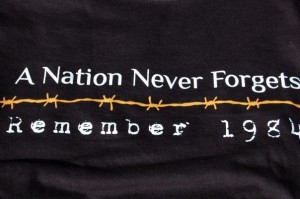
Last week the US military officially ended “Don’t Ask Don’t Tell” (DADT) after President Obama signed a repeal of the 18-year-old anti-gay policy last December. Gay, lesbian, and bisexual service members (note the absence of transgender people, who are still not allowed to serve openly) and advocates of gay rights have been celebrating the repeal as a civil rights victory.
The day the repeal went into effect, President Obama stated:
Patriotic Americans in uniform will no longer have to lie about who they are in order to serve the country they love. Our armed forces will no longer lose the extraordinary skills and combat experience of so many gay and lesbian service members. And today, as Commander in Chief, I want those who were discharged under this law to know that your country deeply values your service.
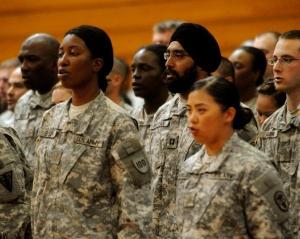
Captain Tejdeep Rattan at his graduation from the US Army basic training
This issue hits close to home for the US Sikh community, since the Pentagon’s uniform policy has not allowed Sikhs to serve with their kesh and dastaar since 1981. Similar to DADT, this is blatant discrimination and is an unacceptable policy for any employer, especially the federal government, which sets a powerful precedent for the rest of society.
Just as rights advocates have been fighting to end DADT for years (and finally succeeded), Sikhs launched a “Right to Serve” campaign in 2009, led by the Sikh Coalition and a Sikh doctor and dentist who were told by the Army to cut their hair when they report for basic training. The impressive efforts of Sikh cadets fighting for their rights and the tireless work of their advocates have resulted in the Army granting accommodations to three Sikhs, who are now serving with their turbans and unshorn hair in tact. The overall policy of the military nevertheless remains discriminatory.
UPDATED ON 9/22/11 at 11:00am (after the fold)
On Wednesday, September 21st at 7pm, the state of Georgia plans to end the life of Troy Davis. Davis’s only hope at this  point may be if prison staff refuse to carry out the execution, if they courageously stand up for what is right, rather than blindly follow orders. He has stated many times, “They can take my body but not my spirit, because I have given my spirit to God.”
point may be if prison staff refuse to carry out the execution, if they courageously stand up for what is right, rather than blindly follow orders. He has stated many times, “They can take my body but not my spirit, because I have given my spirit to God.”
No, Troy Davis is not a Sikh nor does he or his case have any direct connection to the Sikh community. But I am writing this tonight, after his final attempt for clemency denied by the state, to ask you to keep Troy Davis in your thoughts and prayers and to take action in whatever way you see fit. You can immediately sign this petition, you can call or email Judge Penny Freesemann at 912-652-7252/pfreesemann@chathamcounty.org and urge the halt of the execution, you can attend a local rally, you can include Troy in your ardas.
Why?
Because since Davis’s conviction for the murder of a police officer in 1989, seven of the nine witnesses that testified against him have recanted their testimonies.
Because no murder weapon was ever found, and no DNA evidence exists connecting Davis to the crime.
Because some witnesses say another man committed the crime, a witness who testified against Davis.
Because many witnesses have stated in sworn affidavits that they were pressured or coerced by police into testifying against Troy Davis.
Because Troy Davis is a 42-year-old man who should have many more years to live on this planet.
Because as Sikhs, it is our duty to stand up for what is right. The planned execution of Davis is a tragic symptom of a broken and inhumane criminal justice system (which I’ve discussed before here and here). This is a Sikh issue. Indeed, Harinder Singh of the Sikh Research institute states,
As a Sikh, I must fight for criminal justice reforms, as the founders of my faith set the precedent when confronting the Mughal dynasty in South Asia. Guru Nanak confronted Emperor Babar over mass incarcerations, and Guru Hargobind championed prisoner’s rights by challenging Emperor Jahangir; both Gurus, founders of Sikhi, were imprisoned for doing so.
What are we willing to do for Troy Davis and the Troy Davises of the world?
It’s a matter of life and death.
Today, I want to highlight an important initiative that amplifies the unheard, and often undocumented, stories of post-9/11 bigotry, harassment, and discrimination. Launched last week by the Sikh Coalition and co-sponsored by a host of organizations including the American Arab Anti-Discrimination Committee, South Asian Americans Leading Together (SAALT), Muslim Advocates, CAIR-California, and more, Unheard Voices of 9/11 is an interactive website that allows users to upload homemade videos of themselves sharing their experience(s) of post-9/11 injustice.
The site, which has been generating a lot of media attention in the last few days, states:
Members of the Muslim, Sikh, South Asian, and Arab American communities were twice victims of 9/11. Like all Americans we endured a horrific attack on our country by terrorists. We also continue to endure troubling attacks from fellow Americans in the form of hate crimes, employment discrimination, school bullying, profiling and other forms of discrimination.
These stories of discrimination have largely been unheard. This website is meant to give these unheard voices a voice. These are the stories of our community members unfiltered, in their own words. These are the unheard voices of 9/11.
As we are inundated with news about the tenth anniversary of 9/11 this week, it’s refreshing to see a powerful initiative like this one focusing on sharing our stories. It is a courageous, and often painful, act to tell one’s story. But it is necessary, both for the healing process of someone who has experienced injustice, and also for everyone who hears that story, reflects upon it, learns from it, and is moved by it.
As the 10th anniversary of the 9/11 attacks on the World Trade Center and Pentagon approaches, I am filled with a whole  mess of thoughts and emotions. 9/11 was a turning point in the United States–and the world–in so many ways. I need not explain what it has meant for us Sikhs in the United States and beyond, but in the coming days and weeks we will try to highlight some of the important initiatives taking place in commemoration of the 10th anniversary that go beyond jingoistic patriotism and provide opportunities for reflection, dialogue, and moving toward healing and justice.
mess of thoughts and emotions. 9/11 was a turning point in the United States–and the world–in so many ways. I need not explain what it has meant for us Sikhs in the United States and beyond, but in the coming days and weeks we will try to highlight some of the important initiatives taking place in commemoration of the 10th anniversary that go beyond jingoistic patriotism and provide opportunities for reflection, dialogue, and moving toward healing and justice.
Today, I was pleasantly surprised to read a compelling, heartfelt column in the Huffington Post about post-9/11 torture practices by the US government — written by a Sikh. In the piece, Satpal Singh, of the World Sikh Council, states:
I must shed the tears that I have been holding back for seven years. It was 1 a.m. on April 29, 2004, and I could not sleep. The beacon that I had always looked up to had gone dark.
I had just heard about Abu Ghraib. It shook my faith in my country’s ability to uphold its values. Admittedly, it takes the strongest of the strong to face the evil that we were facing, and the highest of morality to face it without losing one’s own morality. But now, even America, the mightiest of the mighty, the champion of human rights, the unquestioned upholder of morality, had blinked in the face of evil. The terror had seized us. Faced with evil, we had abandoned our own values.
One of the many tragedies of the American post-9/11 era is that torture has become a routine tactic in the treatment of terrorism suspects. While these policies began during the Bush Administration (see a new report by Human Rights Watch on the subject here), there seems to be much less protest of their continuation under Obama’s presidency. While Obama promised to closed down the infamous Guantanamo detention center during his presidential campaign, it still remains as do Bush/Cheney era interrogation tactics.
I was listening to NPR a few nights ago while cooking dinner and was excited to hear about a group of Christian and Catholic clergy in Alabama taking action against a new anti-immigrant law in their state.
A few months ago, Alabama followed in Arizona’s footsteps in passing a bill that many are calling the most sweeping anti-immigrant law in the country, going even farther than Arizona’s highly controversial SB 1070.
Alabama’s new bill, H.B. 56, includes similar provisions to Arizona’s SB 1070, including one that authorizes local police to ask anyone they stop about their immigration status based on “reasonable suspicion,” amounting to the legalization of racial profiling.
[H.B. 56] bars illegal immigrants from enrolling in any public college after high school. It obliges public schools to determine the immigration status of all students, requiring parents of foreign-born students to report the immigration status of their children.
The bill…also makes it a crime to knowingly rent housing to an illegal immigrant. It bars businesses from taking tax deductions on wages paid to unauthorized immigrants. (link)
The law also makes it illegal to enter into a contract with, harbor, or transport undocumented immigrants.
Alabama’s Methodist, Episcopal, and Roman Catholic Churches have sued the state of Alabama over this law, saying it violates their religious freedom. Melissa Patrick of the United Methodist Church of Alabama states, “This new legislation goes against the tenets of our Christian faith — to welcome the stranger, to offer hospitality to anyone.”

NYC Sikhs speak out against the Transit Authority's religious discrimination in 2009
This morning, the New York City Council voted unanimously to pass the Workplace Religious Freedom Act (Int. 632-A), a bill that will strengthen the city’s human rights law that protects employees from religious discrimination at their jobs.
According to the City Council,
This law will provide greater protection to workers by strengthening the law that requires employers to provide employees with reasonable accommodations for religious observance.
Employers that are found to have engaged in unlawful discriminatory practices against its workers may be liable for a civil penalty of as much as $125,000 and/or be required to pay compensatory damages, award back pay, reinstate employees and extend full and equal accommodations to employees.
The law is of particular significance to turban-wearing Sikhs and hijab-wearing Muslims who have faced a great deal of discrimination in their workplaces in NYC, particularly since 9/11. Advocates including the Sikh Coalition (who played a lead role in pushing for the legislation) hope that the law will make it much harder for employers in both the public and private sectors to discriminate against potential or current Sikh employees. Notably, the New York Police Department still does not allow turban-wearing Sikhs to serve as officers. (There was a case years back involving a Sikh traffic cop, however, who ended up winning and serves with his turban).
 The second generation (in N. America) of Sikh organizations are beginning to pool their resources and expand their capabilities. Here I feature 2.
The second generation (in N. America) of Sikh organizations are beginning to pool their resources and expand their capabilities. Here I feature 2.
Seva Food Bank – earlier this summer, Seva Food Bank of Canada welcomed Michael Brito as their part-time Operations Manager. We look forward to hearing about the meaning of the expansion and the exciting growth this service Sikh-based organization is undergoing.
ENSAAF – One of the premier human rights organizations working on issues related to the Sikhs is hiring a Case Summary Writer to draft case summaries based on interviews of families whose loved ones were unlawfully killed or disappeared by India’s security forces. The job description reads:
As the case summaries will ultimately be used in a variety of advocacy initiatives and reports, this is an important position that will offer someone a chance to help mobilize international stakeholders on the issue of impunity for mass state crimes in Punjab, India.
We hope a number of Sikhs decide to apply and promote the goals of this extremely important cause. You can get more information on the ENSAAF website, here. Please read the job description and apply! If not, at least circulate, forward, post on Facebook, tweet on Twitter, and get out the word!
This Monday, Sikhs for Justice is organizing a rally at the United Nations Headquarters to call for UN intervention stop India’s planned execution of Professor Devenderpal Singh Bhullar. Professor Bhullar’s brother, Tejinder Singh Bhullar will be addressing the rally. In their appeal to Secretary General Ban Ki moon, Sikhs for Justice is calling upon the U.N. to intervene and free Professor Bhullar based on a UN General Assembly resolution adopted in 2008 known as Resolution 62/149 which called on all major states to abolish the death penalty. 62/149 is a nonbinding instrument to mark progress on the United Nation’s position that they death penalty undermines human dignity and acknowledges the serious claim that any failure of justice in the implementation of the death penalty is irreversible and irreplaceable.
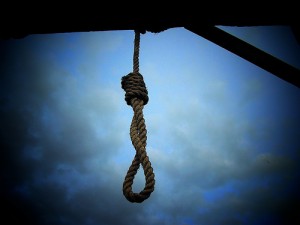 The death penalty too, runs contrary to Sikh historical positions on capital punishment. The Sarkar-e-Khalsa of Maharaja Ranjit Singh Ji, followed a no death penalty policy, as M. Gregor in his 1846 ‘History of the Sikhs’ writes. He notes that, ‘[Ranjit Singh] was the exception of Oriental monarchs, and never wantonly inflicted capital punishment and mutilation.’ Other authors describe, that ‘Humanity indeed, or rather a tenderness for life, was a trait in the character of Ranjit Singh. There is no instances of him having wantonly imbued his hands in blood.’ These sentiments that can be seen as consistent Sikh political philosophy captured by the Zafarnama and other documents. Specifically in the Zafarnama, Guru Gobind Singh Ji quotes the Persian poet Firdausi, writing, ‘How nicely the sweet tongued poet Firdausi has said, to act in haste is the work of the devil,’ referring to Aurungzeb’s executions of the youngest Sahibzadas Zorawar and Fateh Singh and Mata Gujri in Sirhind as the act of ‘Sheitan.’
The death penalty too, runs contrary to Sikh historical positions on capital punishment. The Sarkar-e-Khalsa of Maharaja Ranjit Singh Ji, followed a no death penalty policy, as M. Gregor in his 1846 ‘History of the Sikhs’ writes. He notes that, ‘[Ranjit Singh] was the exception of Oriental monarchs, and never wantonly inflicted capital punishment and mutilation.’ Other authors describe, that ‘Humanity indeed, or rather a tenderness for life, was a trait in the character of Ranjit Singh. There is no instances of him having wantonly imbued his hands in blood.’ These sentiments that can be seen as consistent Sikh political philosophy captured by the Zafarnama and other documents. Specifically in the Zafarnama, Guru Gobind Singh Ji quotes the Persian poet Firdausi, writing, ‘How nicely the sweet tongued poet Firdausi has said, to act in haste is the work of the devil,’ referring to Aurungzeb’s executions of the youngest Sahibzadas Zorawar and Fateh Singh and Mata Gujri in Sirhind as the act of ‘Sheitan.’
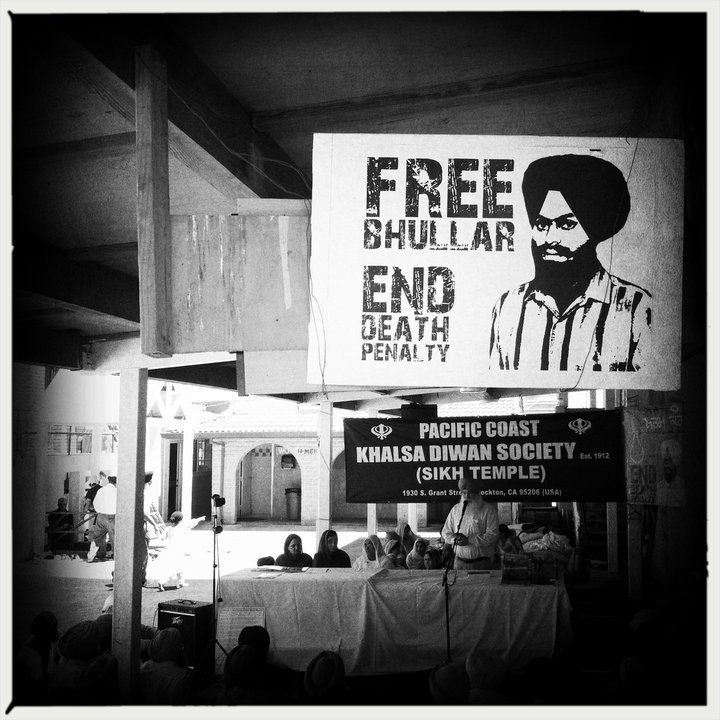 This post has been long overdue. Pagh salute to @SimNona for pushing me to finalize and publish it.
This post has been long overdue. Pagh salute to @SimNona for pushing me to finalize and publish it.
Larger and larger sections of the Sikh community are becoming familiar with the case. Despite the snide comments of the Indian media, even they have caught wind to the increasing T-shirts being seen far and wide, throughout Punjab. The Canadian youth, with the Sikh Activist Network at the forefront, have expressed their concern. The Sikh Federation has pushed for resolutions in the European Parliament and statements of concern by UK Parliamentarians. Amnesty International has weighed in with its opinion. This past weekend the mother of the discussed pleaded the case at the historic Stockton Gurdwara.
What am I talking about? The case of Professor Devender Pal Singh (Davinderpal Singh Bhullar).
Guest blogged by Dilpreet Kaur
Mere days before Osama bin Laden’s capture and death, the Arizona state legislature had set into motion legislative steps to remove a 9/11 hate crime victim’s name from the state’s memorial in Phoenix. At the time, the bill’s original sponsor, Rep. John Kavanaugh (R), claimed that Mr. Balbir Singh Sodhi was “not a victim of 9/11.” Adding insult to injury, along with stripping the late Mr. Sodhi’s name from the memorial, the legislation even enumerated that the removed plaque to be sold to a scrap metal dealer.
Like many others who stumbled across the news of this puzzling piece of legislation, I instantly wondered how and why something so insensitive and outrageous could pass. Four days after 9/11, on September 15, 2001, Balbir Singh Sodhi, a Sikh American, was brutally murdered outside of his Chevron gas station in Mesa, Arizona by Frank Roque, a man who wanted to ‘kill a Muslim’ in retaliation for the terrorist attacks. He had selected Mr. Sodhi simply because he had a beard and wore a turban in accordance with his Sikh faith. An Arizona jury later found Frank Roque guilty of first-degree murder for his hate crime murder of Mr. Sodhi, along with five other charges, including attempted murder and reckless endangerment related to drive-by shootings at other individuals he perceived to be Middle Eastern that same day in 2001.
Balbir Singh Sodhi was the first of hundreds of hate-crimes against Sikh Americans and other minorities related to post-9/11 hate violence. His death as a Sikh American brought national attention to the issue of anti-Muslim and anti-Arab violence following 9/11. At the time, many Arizona state representatives and citizens of all backgrounds rallied around the Sodhi family and the Sikh American community in support, with over 3,000 people attending Mr. Sodhi’s memorial service.
As the Sikh community in Sacramento continues to grieve the losses of hate crime victims Surinder Singh and Gurmej Singh Atwal who were gunned down earlier this Spring (with no suspects still), the Sacramento Sikh Temple has truly embodied the Sikh spirit of sarbat da bhala this past week, extending a hand of solidarity to the gay community.
The Sacramento Sikh Temple is offering a reward of $1,000 for information leading to the arrest and conviction of the perpetrator of a violent hate attack on 26-year-old Seth Parker, who believes he was beaten because he is gay in the parking lot of the Strikes Family Entertainment Center in Elk Grove (the same area with Singh and Atwal were shot). Parker was punched in the face, suffering multiple facial fractures, while the attackers directed homophobic slurs at him.
A spokesperson for the gurdwara stated: “The Sikh Community condemns this disgusting attack motivated by ignorance and hate. In light of the recent murders of two Sikhs in Elk Grove and the hate crime conviction in Yolo County (of two men who attacked a Sikh taxi driver), we are especially sensitive to such crimes. We hope that our reward will help bring these criminals to justice.”
A few years ago I was putting up some flyers on street poles and bulletin boards in Williamsburg, Brooklyn promoting an upcoming concert for my band. If you’re from New York City, you know Williamsburg is a neighborhood covered with concert flyers and band logos, and the home of dozens of music venues filled with indie rock-loving, skinny jeans-wearing hipsters (for the record, this has nothing to do with me nor my old band).
After a few minutes of putting up a bunch of flyers with tape, I was suddenly surrounded by 4 police cars and their flashing sirens. One of the cops approached me, while the others stayed close behind. He had one of our flyers in his hand and asked if I put it up. I said yes. He informed me this was “graffiti” and was illegal. I apologized and said I was not aware of that. He took my ID, talked to his colleagues, and the next thing I know I’m being aggressively handcuffed and put into the back of a police car without any explanation.
To make a long story short, I was arrested because a few years prior to the flyering incident, I got stopped and cited for riding my bicycle for a few feet on a sidewalk (in the rain) and never appeared in court for this egregious violation of the law and disturbance to the peace.
But this isn’t a story about why I got arrested and how ludicrous it is that these cops arrested me rather than asking me to please not put up flyers on street poles (which were already covered with flyers). This isn’t a story about racial or religious profiling and about if these (white) cops were driven by bias or if they were paying special attention to a turbaned, bearded brown man walking down a gentrified, newly predominantly white hipster block of Brooklyn.
This is a story about incarceration.
When I was taken to the precinct, still not knowing why I was arrested or what the hell was going on, I was aggressively and invasively patted down (more like groped) and searched by the officer who arrested me. After a few conversations with other officers at the precinct, I started putting the pieces together in my head as to why I was arrested, and they assured me that I’d be out of there in a few hours. I felt a bit relieved, though still anxious. I was hopeful that I could keep my head up and make it through this with my self-respect and dignity in tact.
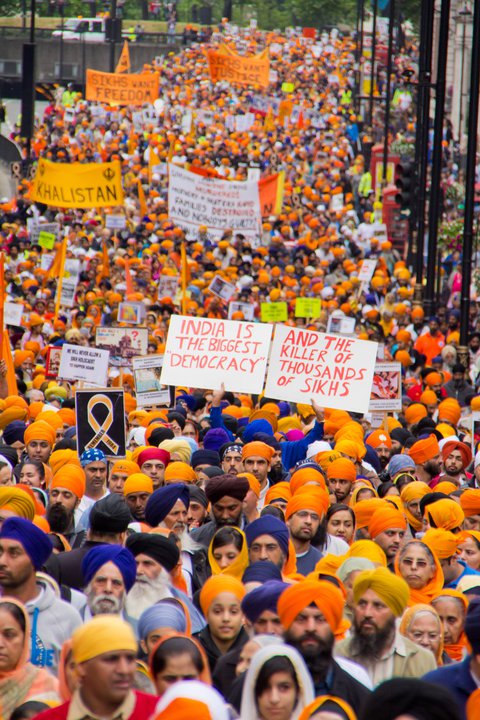 You can repeat your lies….This one comes from the Times of India:
You can repeat your lies….This one comes from the Times of India:
The organisers claimed a figure of 25,000, but the Scotland Yard put the number at 6,000. The ‘Remembrance March’ began at Hyde Park and concluded at Trafalgar Square.[link]
But the truth will get out and you will look all the more stupid for it. Does this look like 6,000? Seems much closer to the 25-35K that was claimed. Sikhs have not forgotten. Until there is justice, Sikhs will never forget.
We will strive for justice for the innocent, such as Professor Bhullar (Watch this powerful video from the WSO’s Annual Parliamentary Dinner; on Professor Bhullar cue to 23:40); we will strive for justice against the guilty.
We live in Bakersfield; we live in Brampton; we live in Birmingham. We still yearn for Bathinda. Our brothers and sisters in London showed it this weekend. Let our brothers and sisters in Punjab know that we are still connected; we will still raise our voices; we still remember.
In Toronto, Lions will roar. A Nation Never Forgets.
Today we remember twenty seven years since June 1984.
We remember twenty seven years since Indira Gandhi sent the Indian Army tanks and artillery to the Darbar Sahib Complex and forty one Gurdwaras across Punjab on the shaheedpurab of Guru Arjan Dev Ji.
We remember twenty seven years since bodies lined the hot marble of the parkarma. Though Government reports indicate 493 civilian deaths and 83 army casualties, eyewitness accounts suggest the numbers were much higher since 10,000 pilgrims and 1300 workers were unable to flee the Darbar Sahib complex on this day.
We remember twenty seven years since books, manuscripts and other documents have been reported missing from the Sikh Reference Library numbering 10,534. The library which was intact on June 6th had been burnt down by June 14th. In April 2004, many of these writings, which included handwritten manuscripts were reported to be in the hands of the Union Government where they remain today.
We remember twenty seven years since the events that spurred the November 1984 pogroms and the government lead counter-insurgency in Punjab which left a generation of 25,000 missing.
We remember twenty seven years since Sikh women (and men) learned too well that coercion does not just come from tanks and artillery – that sexual violence can be a systematic and deliberate weapon of the State.
We remember twenty seven years since Punjab was left a political climate that hid the state’s impending agrarian crisis and its interrelated manifestations of farmer suicides, drug addiction and gendercide, even when reports as early as the 1985 Johl Report warned that the farming sector was faltering and the real need to diversify crops from the standard wheat-paddy rotation.
We remember the impact this had on the Sikh Diaspora, the communities New York, California and Canada, and the tireless nights many of our fathers and mothers spent out, mobilizing themselves even as recent immigrants with young daughters and sons.
We are a community that is well versed in Remembrance.
Last week marked the 63rd anniversary of the Nakba, meaning catastrophe, when a n estimated 700,000 Palestinians were displaced from their homes with the establishment of the state of Israel in 1948. I, and others, have argued elsewhere why the Palestinian struggle for freedom and self-determination is relevant for us as Sikhs, so I won’t reiterate that here (see Sikh Solidarity with Palestine statement).
n estimated 700,000 Palestinians were displaced from their homes with the establishment of the state of Israel in 1948. I, and others, have argued elsewhere why the Palestinian struggle for freedom and self-determination is relevant for us as Sikhs, so I won’t reiterate that here (see Sikh Solidarity with Palestine statement).
Every year Palestinians and their supporters commemorate the Nakba by holding demonstrations, vigils, and educational events. This year saw unprecedented resistance by Palestinians in the Middle East, who mobilized at numerous points across Israel’s borders. Their resistance to occupation and their commemoration of one catastrophe was met with with violent repression by Israeli forces — catastrophe upon catastrophe. 14 Palestinians were killed and hundreds more injured as Israeli troops fired on the massive protests.
In an interview on Democracy Now last week, Fadi Quran, one of the protest organizers stated:
…we, as a youth movement, called for the protest because, as many of you know, there are about seven million Palestinian refugees who just want to go home, and they’ve been unable to go home for the last 63 years. So at the protest, initially what you had is a lot of people who are my generation, 23 years old, carrying or wheeling their grandparents to the border so that they can finally take them back and they can return to a normal life, where they are free, where they live justly, and where they can pursue happiness.
Today marks the 86th birthday of the late African American activist Malcolm X. We’ve been hearing a lot about Malcolm X lately since the recent release of a new biography about him written by the great scholar Manning Marable, who just passed away a few weeks ago.
A controversial and often misunderstood historical figure, Malcolm X was a Muslim and saw his faith in God as inextricably tied to his relentless fight against racism and injustice. At the end of the day, it all came back to human rights. We Sikhs know the long struggle for human rights all too well, and I for one take inspiration from this fearless leader who tragically lost his life at the age of 39 in his fight for human rights and dignity.

It’s been over a week now. I’ve been wanting to write, but have been on the road, my head spinning with newspa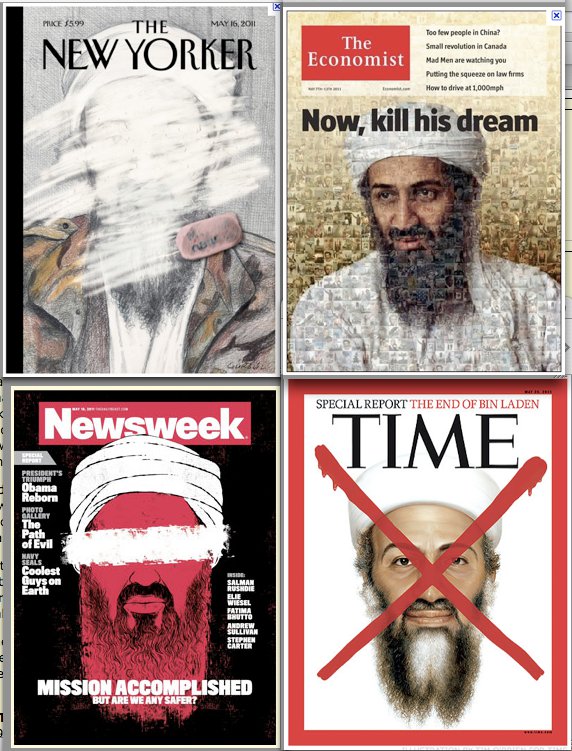 per headlines and the voices of cable news pundits. Navdeep posted some thoughtful reflections and questions here, and in the meantime, we’ve had the opportunity to see the response to bin Laden’s death throughout the country and world. By now, we are all probably well aware of the spontaneous celebrations of thousands at Ground Zero and Time Square in New York City and at the White House, with victorious chants of “USA! USA!”, the night President Obama made the announcement of bin Laden’s death.
per headlines and the voices of cable news pundits. Navdeep posted some thoughtful reflections and questions here, and in the meantime, we’ve had the opportunity to see the response to bin Laden’s death throughout the country and world. By now, we are all probably well aware of the spontaneous celebrations of thousands at Ground Zero and Time Square in New York City and at the White House, with victorious chants of “USA! USA!”, the night President Obama made the announcement of bin Laden’s death.
I was traveling in New Orleans when the news hit, and the mood there was similar. God Bless Americas were being yelled in bars of the touristy French Quarter, people running down the streets (drunkly) yelling “We killed him! We killed him!” with a disturbingly rage-filled glee.
I happened to be exploring the city on my own that night, and was immediately nervous when I heard the news. Within a few minutes, several strangers made snide and/or aggressive comments about bin Laden’s death directly to me, as if to imply that I was related to him. Throughout my week of time in New Orleans and Texas thereafter, strangers heckled me with taunts of “Osama” almost every day. One day, a young kid leaving school (maybe 10 years old) asked me, seemingly earnestly, if I was a terrorist. And I was even pulled out of a night club in Houston by security because I was carrying a bag (which had an instrument in it).
Indeed, the death of bin Laden does not appear to mean the death of bigotry. Colorlines reports:
A mosque in Maine was vandalized with the messages “Osama today, Islam tomorrow” and “Go Home.” In Houston, a schoolteacher was disciplined for racially profiling a Muslim ninth-grader by asking if she was grieving her uncle’s death on Monday. Also this week, Mohamed Kotbi, an Arab waiter who is suing his employer, the Waldorf-Astoria hotel, for religious and racial discrimination following the 9/11 attacks, has reported more taunts from co-workers following bin Laden’s death.
I am curious if other Sikhs have experienced a similar rise in harassment. What does it mean that when the US claims victory over Enemy #1, the general public vilifies Muslims and turban-wearing Sikhs even more? Sometimes it seems we’ve made little progress since the hateful aftermath of 9/11, and perhaps are even moving backwards.
Our mothers and grandmothers would be proud. If we take a moment to pause, we’ll see the amazing mobilization that is occurring in the diaspora around Sikh women’s issues, particularly by youth. I’m not quite sure if it is a legit rise in websites or events or whether we are simply paying more attention to the topic. Regardless, it is clear that there are now more forums and platforms for discussion cultivating the need for women (and men!) to come together and address issues affecting Half the Sky. This post will give a round-up of some amazing work that is happening in our community, bringing together our qaum to discuss important issues affecting Sikh women.
 {Kaurista} It is clear that Sikh women, like all women around the world, value an open space to discuss issues that directly impact us. Whether it is conversations about clothes, hair, identity or our activism – there needs to exist a space that is catered to providing Sikh girls and women with a sense of unity. This type of comraderie cannot be understated – it impacts an individual’s self esteem and confidence in a substantial way. With the launch of Kaurista.com and the immediate posting of the link all over Facebook, it is hard not to notice how much support there is for this type of forum. Kaurista provides conversations on six different topics including, Lifestyle, Style & Beauty, Family, Inspiration and Health & Wellness. One of my favourite sections of the website is “Ask Kaurista” where questions related to wanting to marry a sardar, going to prom, or overcoming alcohol abuse are answered. The site is not only aimed at Sikh girls. In fact, it actively includes Sikh men in discussions – and perhaps the hope is that through these types of discussions, Sikh men will value how truly dynamic Sikh women are!
{Kaurista} It is clear that Sikh women, like all women around the world, value an open space to discuss issues that directly impact us. Whether it is conversations about clothes, hair, identity or our activism – there needs to exist a space that is catered to providing Sikh girls and women with a sense of unity. This type of comraderie cannot be understated – it impacts an individual’s self esteem and confidence in a substantial way. With the launch of Kaurista.com and the immediate posting of the link all over Facebook, it is hard not to notice how much support there is for this type of forum. Kaurista provides conversations on six different topics including, Lifestyle, Style & Beauty, Family, Inspiration and Health & Wellness. One of my favourite sections of the website is “Ask Kaurista” where questions related to wanting to marry a sardar, going to prom, or overcoming alcohol abuse are answered. The site is not only aimed at Sikh girls. In fact, it actively includes Sikh men in discussions – and perhaps the hope is that through these types of discussions, Sikh men will value how truly dynamic Sikh women are!
{HERSTORY}
While Sikhs around the world were celebrating Vaisakhi last week, 78-year-old Gurmej Singh Atwal, one of th e two men who were shot in what was likely a hate attack in Elk Grove, California in March, died on Friday. The Sacramento Bee reports:
e two men who were shot in what was likely a hate attack in Elk Grove, California in March, died on Friday. The Sacramento Bee reports:
“He’s no more,” his son said. “First the kidneys went off, then the lungs and then brain. … He was shot in the upper right chest, one bullet went straight to his lungs and the other to his pancreas, liver and intestines.”
A grief-stricken Atwal said, “My dad was going to be a key witness” in the shooting. Also shot was Surinder Singh, 65, who died at the scene.
This tragic loss came two days after California’s “Sikh Solidarity Day,” initiated by State Senator Darrell Steinberg and California Sikhs to raise awareness about the Sikh identity in light of the horrific March 4th attack on Atwal and Singh in Elk Grove.
“Let us pick a day together when we are all Sikh Americans, we are all Californians and we all stand together,” state Senate President Pro Tem Darrell Steinberg said before several hundred members of the Sikh Temple of Sacramento in West Sacramento.
“Any attack on one of us is an attack on all of us,” the Sacramento Democrat said. He suggested that on a chosen day – which was quickly decided as April 13 – civic leaders and community members could wear either a man’s turban or a woman’s Punjabi suit with chunni, or headwear, as a symbol of support.
No arrests of suspects have been made thus far. The reward offered by the police department and Sikh and Muslim community groups for information leading to arrests is now $43,000.
Mourning the loss of Gurmej Singh Atwal and Surinder Singh (who died immediately after the shooting), we hope and pray for a day when the Sikh identity will no longer be under attack, when we can walk down the street with our dastars without fear.
The controversial new French law that bans Muslim women from wearing the niqab, or full-face veil, went into effect today and was met with resistance in Paris. The New York Times reports:
The police detained two fully veiled women at a small protest outside the Notre Dame cathedral in central Paris, where demonstrators were easily outnumbered by police officers and journalists. But it was not clear whether the women had been held under laws forbidding unauthorized demonstrations.
French authorities estimate that less than 2,000 women in the entire country even wear the niqab, in a country of nearly 63 million. The NYT article continues:
The ban also applies to foreigners visiting France… Violators may be punished with a fine of 150 euros, equivalent to $215. But people forcing others to cover their faces are subject to much stiffer punishments, including a maximum 12 months in prison and a fine of 30,000 euros, equivalent to more than $42,000, or twice that amount if the person forced to cover their face is a minor.
I’ve argued before that France’s so-called attempts at “liberating” Muslim women in reality perpetuates racist and assimilationist notions of national identity. Some Muslims in France are organizing to challenge the law. One wealthy property developer has set aside some $2.8 million to help women fight the ban and is encouraging women to wear the niqab in the streets as a form of civil disobedience. (Check out this video of a French Muslim woman taking a train to Paris today wearing her niqab)
